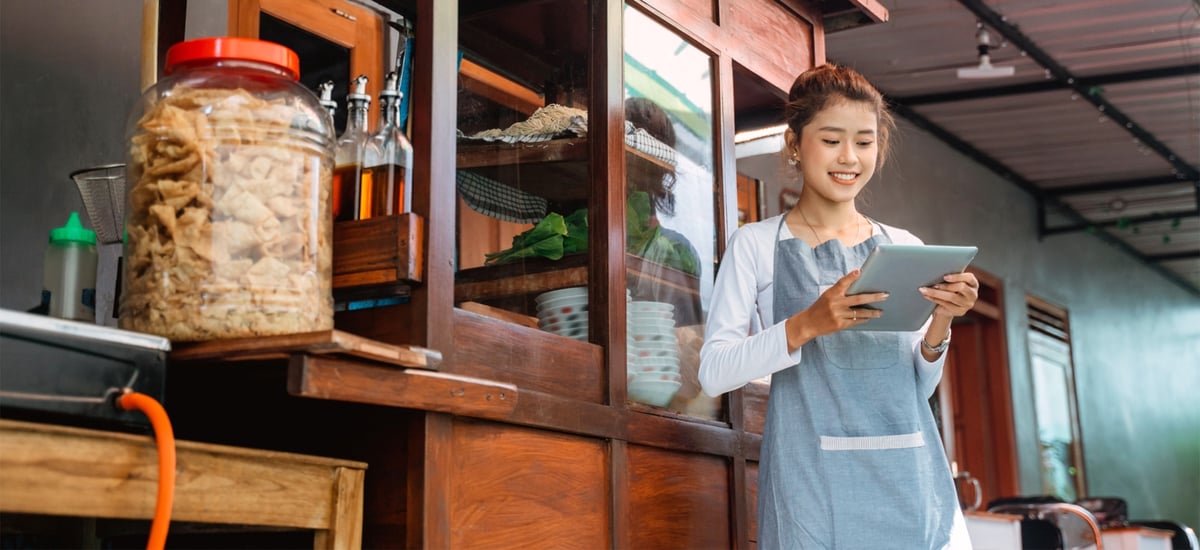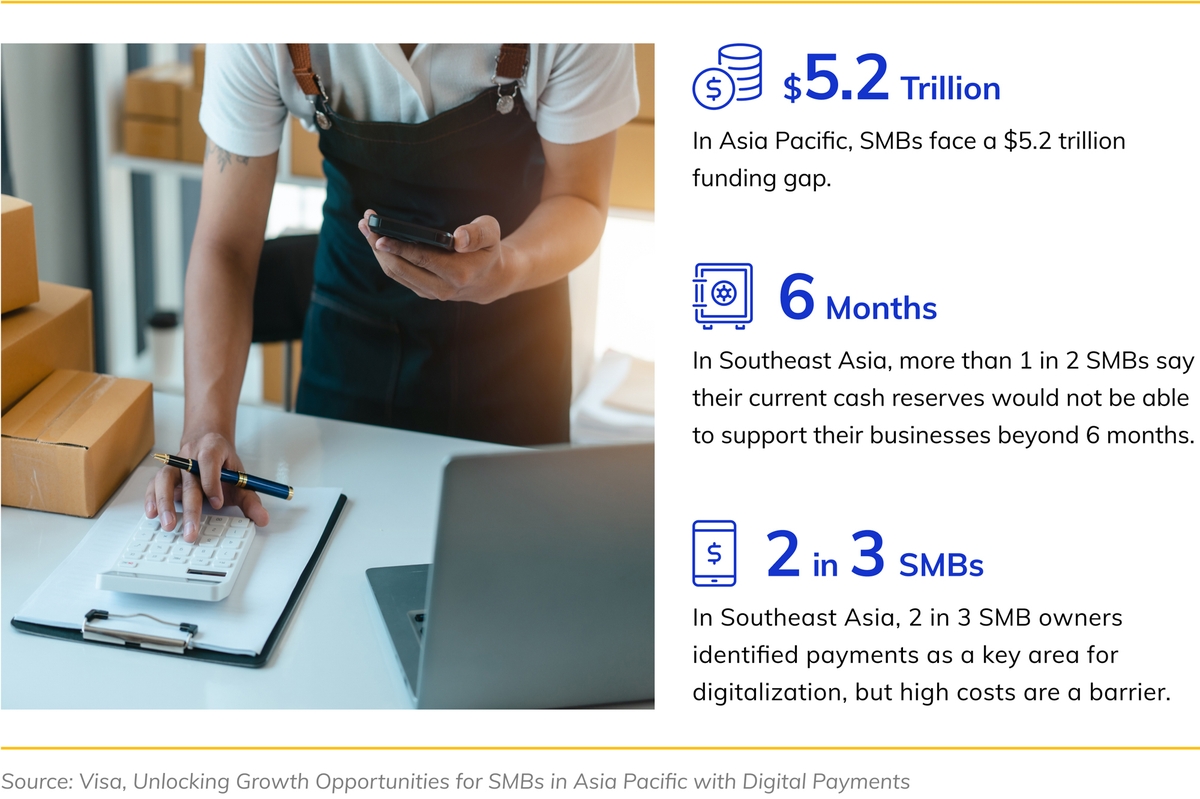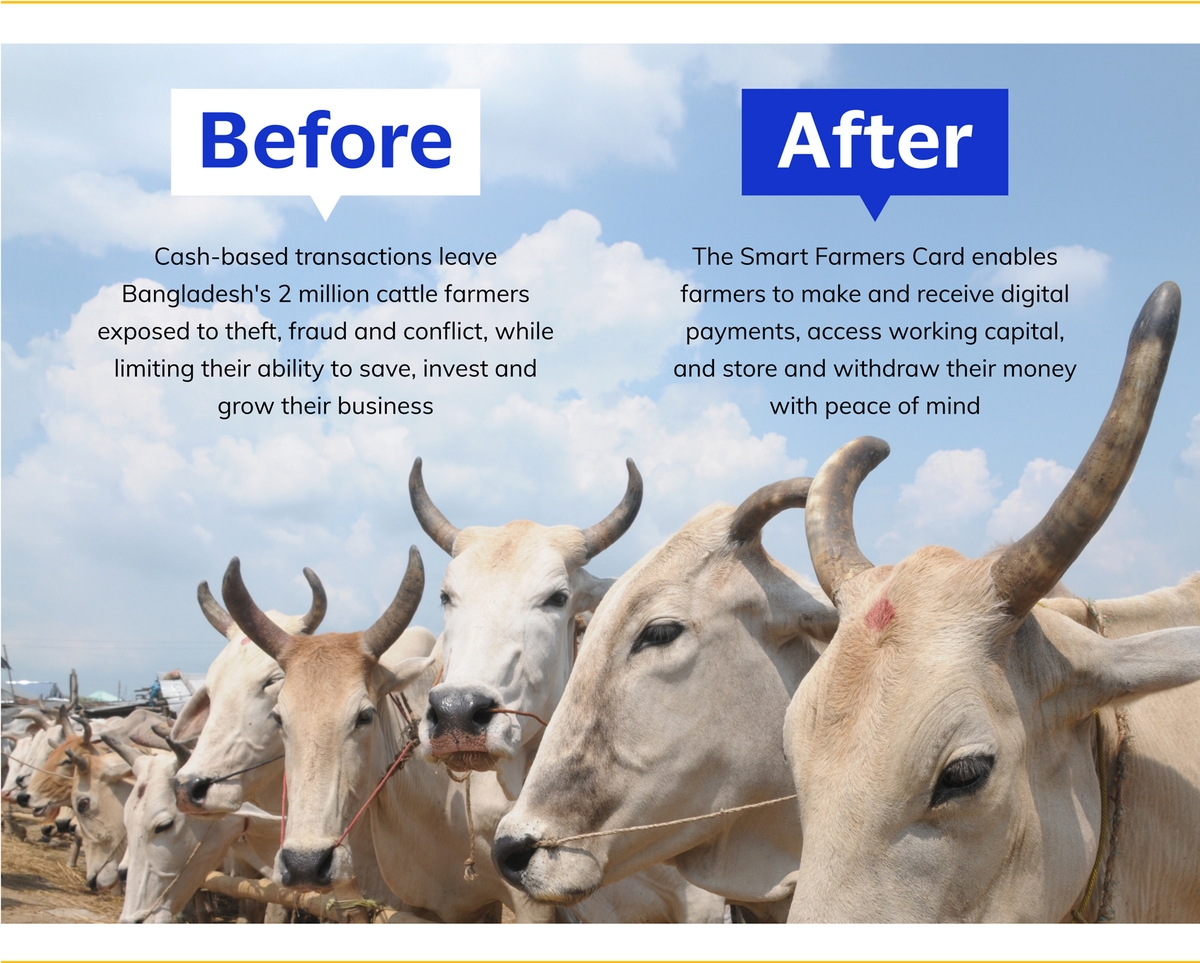
Leveling the Paying Field: How Visa Helps Small Businesses Go Big
Asia Pacific is one of the world’s most digitally connected, disruptive and technologically savvy regions – and its appetite for digital transformation is on full display.
Between 2015 and 2022, the region’s digital exports surged 9%, outpacing the global average of 6.8%, according to the United Nations. By 2030, Southeast Asia's internet economy is forecast to reach $1 trillion, driven by a fast-growing base of digital consumers. And across South Asia, governments are underpinning their national strategies with digital agendas.
For the 200 million small and medium businesses (SMBs) that collectively employ 70% of Asia Pacific’s workforce and account for 60% of the region’s cumulative GDP, according to Visa's estimates, the digital economy represents an opportunity to streamline and transform their day-to-day operations, while enhancing their reach and competitiveness.
Small Businesses Face Large Hurdles
While many of the region's SMBs would like to digitalize their businesses – with 75% of SMB owners in Southeast Asia wanting more digital payments, and 53% wanting greater digitalization in lending, according to the World Economic Forum – time and costs are frequent barriers to SMB digitalization. Compared to larger businesses, SMBs have fewer resources, leaner staff and more restricted access to capital.

Small Businesses See Digital Payments as Growth Opportunity
Despite these challenges, 85% of SMBs in Asia Pacific remain optimistic or very optimistic about the future of their businesses, according to Visa’s Back to Business Study in 2023. The study further revealed more than 1 in 3 SMBs believe that accepting new forms of payment is the best opportunity for business growth – a sentiment especially pronounced in Asia Pacific, which is outpacing the rest of the world in its shift to digital payments.
When coupled with growing government support, a partner that can simplify payments infrastructure is key for SMBs in Asia Pacific to embrace digital transactions. A survey by Visa found that nearly 6 in 10 businesses that do not accept card payments are more likely to do so if they had the right support, especially in four areas:
- Comprehensive transaction security that reduces their risk of financial losses from cybercrime
- Faster speed of payment settlements to help them save time through rapid transactions
- More cost-effective solutions that defray the expenses of payment acceptance
- Better value-added services that offer credit, instalment and loyalty programs
Empowering Bangladeshi Farmers Through Financial Inclusion
For Bangladesh’s two million cattle farmers, each of these digital payment advantages is intensified by the industry’s traditional reliance on cash, which leaves them exposed to round-the-clock risks of theft, fraud and conflict.
And despite driving an estimated 1.4 trillion taka ($12.8 billion) in transactions every year, the nation's cattle farmers navigate plenty of uncertainty, from climate change and seasonal diseases to limited breeding resources and market fluctuations. 70% of the nation’s primarily rural cattle farmers are not connected to any formal financial services – hindering their ability to save, invest and grow their businesses.
Recognizing that farmers need a new solution, local organizations were eager to act, but needed partners who could provide payment expertise and infrastructural know-how. This gap sparked a partnership between Visa and BRAC Bank, to launch the Smart Farmers Card in June 2023.
As both a debit and a credit card, the Smart Farmers Card enables Bangladesh’s cattle farmers to store and withdraw funds, and access small sums of working capital through credit limits. This represents a milestone for financial inclusion in emerging economies, where the odds of credit access are heavily stacked against farmers.
The card further helps cattle farmers unlock discounts and incentives from their merchants and suppliers, such as feed suppliers, veterinarians and insurance companies.

“The Smart Farmers Card brings Bangladesh’s cattle farmers – the lifeblood of the country's agricultural economy – under a formal, digital financial system that offers greater security, convenience, access and efficiency than cash,” notes Sabbir Ahmed, Country Manager – Bangladesh, Nepal & Bhutan, Visa.
Within months of its introduction, the Smart Farmers Card digitized $27,000 of cash transactions, equivalent to what 100 cattle farmers in Bangladesh earn in a month.
“This rapid and successful uptake demonstrates the appetite among farmers, previously underbanked, to embrace digital payments and financial services," Sabbir says, "especially when they’ve experienced how it enables them to grow their livelihoods with certainty and peace of mind.”
As more cattle farmers adopt the Smart Farmers Card, cattle farming and trading in Bangladesh will continue to modernize and grow in line with Vision 2041, a smart nation strategy from the Bangladeshi government rooted in financial inclusion and tech-led industrialization.
Accelerating Digital Payments Across the Philippines
Besides the prevalence of cash, lengthy onboarding processes have been a persistent barrier to SMBs’ adoption of digital payments. This is particularly pronounced in the Philippines, where less than one-third of the nation’s 1.1 million registered micro, small and medium enterprises (MSMEs) accept card payments, according to statistics from the Department of Trade and Industry and research by Visa.
While many SMBs want to match their customers’ growing preference for digital payments, they lack the time to fill in lengthy paperwork and navigate layers of red tape from banks. To mitigate these obstacles, Visa launched the Rapid Seller Onboarding (RSO) program, an all-in-one digital onboarding, due diligence and underwriting solution that streamlines and accelerates digital payment acceptance.
Among Visa's RSO partners are Maya, a financial services and digital payments company, and PayMongo, a payment getaway. With the RSO program now live, Maya and PayMongo can digitally onboard MSMEs and accept digital payments within a fraction of the time it takes to be onboarded through conventional digital processes. This new efficiency is crucial in accelerating digital transformation in the Philippines, where digital payments surged to 42% of total payments in 2022 – a major leap from 1% in 2013, according to Visa's research of Philippine SMBs in 2023.
As the nation’s cashless ambitions continue to grow, consumers in the Philippines are also increasingly choosing digital payments. Data from Visa’s latest Consumer Payment Attitudes study shows that 43% of Filipinos are carrying less cash in their wallets, and 83% tried to go cashless in 2023. Meanwhile, a recent Visa study found that 60% of SMBs in the Philippines saw an increase in revenue after adopting digital payments.
“SMBs are estimated to contribute 36% to the GDP of the Philippines. Our research shows that this could potentially increase if they adopt digital payment modes. Visa is aligned with the government’s financial inclusion and digitization strategies, and committed to supporting SMBs that form the core of the Filipino economy," notes Jeff Navarro, Country Manager for Visa Philippines.
"Our goal is to close the gap for digital and financial inclusion and support SMBs in growing their businesses, both domestically and beyond borders. With many Filipino consumers being mobile, digital, and at times located beyond city centers, SMBs that can utilize digital payments will survive and thrive in a modern digital economy."
With 70% of SMBs who accept digital payments seeing an increase in turnover across the region, it’s both fortuitous and by design that a company that started as an experimental statewide credit card – now a global leader in digital payments – is helping Asia Pacific’s small businesses achieve their own ambitions.
From enabling digital payment acceptance to accelerating global expansion, Visa’s wide-ranging SMB solutions simplify every stage of the digital journey.
Find out how Visa can unlock growth for small businesses and read the Small Business, Big Future research paper here.
